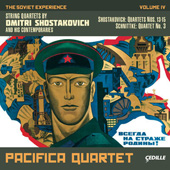

This is the final release in the Pacifica Quartetís cycle of the Shostakovich string quartets and, in keeping with the series title, The Soviet Experience, includes a
quartet by Alfred Schnittke.
There is considerable controversy as to whether Shostakovichís music expresses a crypto-dissidence. Until 1979, three years after the composerís death, western
opinion had it that he had been a sincere Communist. Then musicologist Solomon Volkov published a book entitled Testimony, purporting to be the composerís
memoirs as dictated to Volkov. According to the book, Shostakovich was a closet dissident and much of his music has crypto statements of dissent. There is an
exhaustive web site Music Under Soviet Rule that explores his life and music from this perspective.
There was a reaction to this, quite a reasonable one I would say. I may write more about the controversy in the future, but for now I mention it to introduce
two points. First, music should be judged as music. It may be interesting to know the circumstances of its composition, but if the composer himself has not
provided program notes or an explicit subtext, we cannot know what he may have intended. And even if we do know, as in opera for example, the music will
either succeed or not on its musical merits.
The second point is that the last three Shostakovich quartets were written at a time when his day-to-day tensions with officialdom were no longer an overriding
issue and his music had become increasingly introspective or, to use his friend Boris Berlinskyís word, serene. These works are generally solemn and almost
always darkly beautiful. Sometimes they move into a realm of gentle loveliness, especially in parts of the Quartet in B-flat minor, op. 132.
Now there are those who claim that these late quartets were meant to convey the blackest despair, but I donít believe it. Or, if that was the composerís intent,
it doesnít succeed with me. Yet they offer me some profound and enlightening musical experiences. Perhaps what inspires me is the courage that it takes for an
artist like Shostakovich, or Beethoven to cite another example, to transform the travails of their existence into musical expressions of order and truth.
There have been numerous recordings of the individual quartets and, by now, several of the complete series. Almost all of them, including those by the Manderling,
Rubio and Emerson String Quartets have their strengths and are recommendable. But the versions of record, so to speak, have long been those by the
Fitzwilliam and Borodin String Quartets. The Fitzwilliams were the last ensemble to work directly with the composer before his death and are eminently
convincing in their recordings. By the time the Borodins recorded their complete set, only two of them had actually known Shostakovich.
I havenít heard all of the Pacifica set, but those quartets I have heard have been outstanding. These late ones bear comfortable comparison with the Borodin
and Fitzwilliam versions. If anything, their emotional compass is wider. They manage to convey the moments of sweetness without any suggestion of irony, but
dramatic eruptions here and there are given their due as well.
The recorded sound is adequate in the Fitzwilliam version and fairly good in the Borodin. The Pacifica set is endowed with state-of-the-art sound.
Each volume of the set offers a piece by another Soviet composer, in this case Alfred Schnittkeís String Quartet no. 3. It makes a nice companion to the
Shostakovich quartets. It is clearly indebted to Shostakovich, but Schnittkeís voice is distinct and in some ways more complex, particularly in the matter of
texture. Itís definitely worth getting to know.
Richard Todd - September 2014